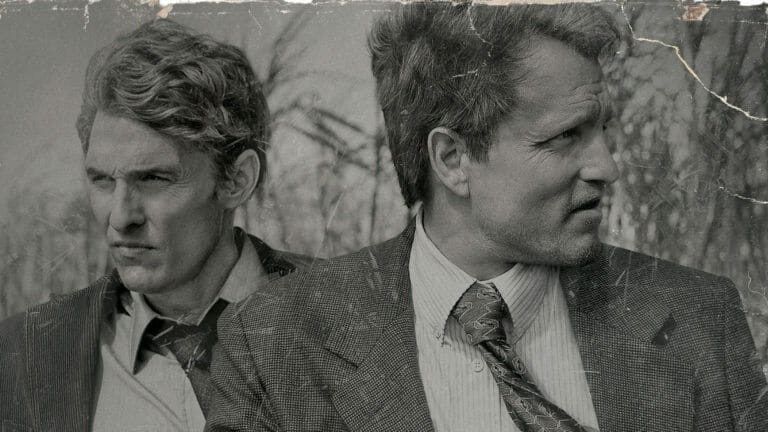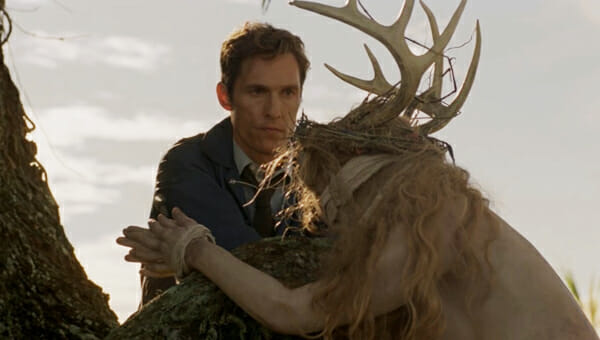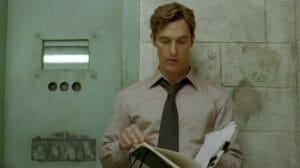Sign up for the
TSL Newsletter
and get $50 off Final Draft 12
By Staff · September 11, 2017

By Steffanie Moyers
With the recent announcement that filmmaker Jeremy Saulnier and Academy Award winner Mahershala Ali are joining HBO’s True Detective for a third season, we thought it would be an ideal time to look back through the philosophical underpinnings that made the show’s influential first season so successful. Our hope is to shine a light on what worked so well about the first season – particularly in comparison to its much-maligned follow-up.
The first season of True Detective has left an unquestionable mark in Television history. It came seemingly out of nowhere from novelist-turned-show-runner Nic Pizzolatto. The story inspired from a culmination of his background, books he loves and his novel – Galveston. True Detective season one plays like a novel on screen through misanthropic dialogue and ethereal aesthetic prose.

The most notable examples of this emerge from Rust Cohle’s deep philosophical monologues about “the terrible and secret fate of all life”.Rust is a man of deep convictions tailored by his “realist” philosophical tendencies. Throughout the 8 one-hour episodes, we spiral through three time periods with his partner Marty Hart to chase down a Satanic serial killer in “the sprawl” (as Cohle refers to it) of Louisiana. “This place feels like someone’s memory of a town, but the memory’s fading”.
Hart, as much as he protests Cohle’s unfiltered thoughts, occasionally choses to willingly pick Cohle’s brain, which is more like opening Pandora’s existential box. “Look I’d consider myself a realist, but in philosophical terms I’m what’s called a pessimist.” Hart prods him further, shortly after telling him not to say any “crazy shit”, setting the tone early on that he is an indecisive man.
Cohle: It means I’m bad at parties. I think human consciousness is a tragic misstep in evolution. We became too self aware. Nature created an aspect of nature separate from itself; we are creatures that should not exist by natural law. We are things that labor under the illusion of having a self. The secretion of sensory experience and feeling. Programmed with total assurance that we are each somebody. When in fact everybody is nobody. I think the honorable thing for our species to do is deny our programming. Stop reproducing. Walk hand and hand into extinction. One last midnight, brothers and sisters opting out of a raw deal.
Hart: Ok, so what’s the point of getting out of bed in the morning?
Cohle: I tell myself I bare witness. But the real answer is that it’s obviously my programming, that and I lack the constitution for suicide.
As the series progresses, Cohle seems to have a view or comment on nearly everything and everyone around him. He declines his subscription to the notion of having a purpose, of having a sense of self, to “be somebody”. Yet the more he’s on this case, the longer he knows Hart, we come to realize the story is not about the unsolved murders or missing persons – the story is about Cohle and Hart’s life, and arguably, purpose. They are polar opposites who balance one another with their blend of stark and loose ideations. In episode two, Hart states that “there was a time men didn’t air their bullshit to the world, you know, it just wasn’t a part of their job. I think part of Rust’s problem is there were things he needed that he couldn’t admit to.”
 Hart is a man who seeks what he wants without guilt or explanation. Chole says of him once, “people incapable of guilt usually do have a good time”. Hart is married with two daughters, but seeks solace in his mid-life crisis and fills his urges with cheating, booze, and camaraderie; vices disguised by an otherwise happy life. He dictates in the interrogation room twenty odd years later, “the rest of us had families, people in our lives. Good things. People give you rules. Rules describe the shape of things. That’s why I always said, I think Rust needed a family. It’s boundaries. Boundaries are good.”
Hart is a man who seeks what he wants without guilt or explanation. Chole says of him once, “people incapable of guilt usually do have a good time”. Hart is married with two daughters, but seeks solace in his mid-life crisis and fills his urges with cheating, booze, and camaraderie; vices disguised by an otherwise happy life. He dictates in the interrogation room twenty odd years later, “the rest of us had families, people in our lives. Good things. People give you rules. Rules describe the shape of things. That’s why I always said, I think Rust needed a family. It’s boundaries. Boundaries are good.”
Cohle on the other hand, once had everything Hart does and lost it. His daughter was killed and his “marriage couldn’t survive something like that”. He’s since openly battled alcohol addiction, actively avoided other people and buried himself in work disguised with a purpose. He’s said of himself, “I can be hard to live with. I don’t mean to but I can be critical. Sometimes I think it’s not good for people. It’s not good for them to be around me. I wear them down. They get unhappy. You reach a certain age you know who you are. I know who I am. After all these years there’s a victory in that.”
The real juxtaposition of True Detective is a narrative of two men who will never admit they want what the other has. Cohle wants Hart’s family and is angry at Hart as he watches him selfishly throw it away. Hart wants to be able to think, act, and have the confidence and commitment to know himself and what he wants like Cohle does, though he would never admit it; in a way he looks up to Cohle as the kind of man he wishes he was. As Showrunner and sole-writer of the series Nic Pizzolatto says of Cohle’s character, “Cohle runs on a more hyperactive brain, which, to people not-so-inclined to those types of perceptions would tend to be unsettling”.
More than halfway through the series, after Hart’s wife seeks revenge on years of deplorable infidelity by seducing Cohle one night, she says of him: “Rust knew exactly who he was, and there was no talking him out of it. Marty’s biggest problem is he never knew who he was, so he didn’t know what to want. Rust was an intense man, but he had integrity. He was responsible. Not a lot of responsible people in the world.” To quote Cohle, “I strike you as more of a talker or a doer?”
To wit, Hart says in an earlier episode, “past a certain point, there’s a futility in responsibility”. It’s at this point in the series the two detectives catch their supposed killer and close the case. As a viewer, you begin to hone in on the true purpose of the story – we were eluded by a serial killer chase, when it was never about that. The detective’s curse is laced surreptitiously throughout the scripts and weaved together delicately for viewers to pick up clues on screen.
 Hart: You know the detective’s curse? The solution was right under my nose the whole time, but I was paying attention to the wrong clues.
Hart: You know the detective’s curse? The solution was right under my nose the whole time, but I was paying attention to the wrong clues.
This is precisely what Pizzolatto has played out for not only the characters, but the viewers. Once the killer is caught, we see time flash forward. Cohle becomes bored with the contempt state of his life, and Hart become fearful with his.
Hart: Do you know the good years while you’re in them? Or do you wait until you have ass cancer to realize they’ve already passed you by? There’s this feeling, you might notice it sometimes, like life has slipped through your fingers. Like the futures behind you, like it’s always been behind you. It’s like I’m that coyote in the cartoon, running off a cliff. And if I don’t look down, and just keep running, I might be ok.
He laments again about the detective’s curse, “the solution to my whole life was right under my nose…and I was watching everything else”. Hart often projects his fear onto Rust, while simultaneously digging deep into his psychological pathways for unseen answers to his own existential woes.
Cohle: You never liked being judged.
Hart: No you’re right I don’t, not by you. It’s hard to find something in a man that rejects people as much as you do, you know that?
Cohle: Look, however illusory our identities are, we craft those identities by making value judgments. Everybody judges, all the time. You got a problem with that, you’re living wrong.
Hart’s wife explains after the divorce, Marty “found religion for awhile”, assuaging that he was still lost as to who he was or what identity he wanted to adopt through his continuing spiral of mid-life crises and identity commitment crises. It’s an interesting line, and not at all an unintentional one as your more detective-like viewers will pick up on.
Earlier in episode 3, Hart and Cohle attend a “Friends of Christ” convention and delve deep into their opposing religious views with heavily philosophical banter and some of the best dialogue to be portrayed about religion on television. The preacher un-coincidentally bemoans, “the face you wear is not your own…” as Hart and Cohle approach the gathering.
Cohle: What do you think the average IQ of this group is?
Hart: What do you know about these people?
Cohle: Just observation and deduction. I see a propensity for obesity, poverty, again for fairy tales. Folks putting what few bucks they do have into little wicker baskets being passed around. I think it’s safe to say that nobody here’s going to be splitting the atom, Marty.
Hart: You see that? Your fuckin’ attitude. Some folks enjoy community, the common good.
Cohle: Well if the common good has got to make up fairy tales, then it’s not good for anybody.
Hart contemplates this for a moment. There is a visible discern of a mental shift within himself. He remains silent for a moment, then presses Cohle, almost like a child unwillingly asking an older sibling for advice against their better judgment.
Hart: I mean can you imagine, if people didn’t believe? The things they’d get up to?
Cohle: The exact same thing they do now. Just out in the open.
Hart bristles at this, seemingly agitated that he asked and he counters.
Hart: Bull. Shit. It’d be a fuckin’ freak show of murder and debauchery and you know it.
Cohle: If the only thing keeping a person decent is the expectation of divine reward, then brother, that person is a piece of shit. What’s it say about life? You gotta get together, tell yourself stories that violate every law of the universe just to get through the goddamn day? What’s that say about your reality, Marty? It’s been this way since one monkey told the other monkey hey, the sun said to give me your fuckin share. People are so goddamn frail they’d rather put a coin in a wishing well than buy dinner.
Hart: When you get to talking like this, you sound panicked.
Cohle: Transference of fear and self loathing to an authoritarian vessel – its catharsis. He absorbs their dread with his narrative. Because of this, he’s effective to the proportion of the amount of certainty he can project. Certain linguistic anthropologists think religion is a language virus, that rewrites pathways in the brain and dulls critical thinking.
Hart: For a guy who sees no point in existence, you sure fret about it an awful lot. And you still sound panicked.
Cohle: At least I’m not racing to a red light.
In the interrogation room, recanting this story nearly twenty years later, he goes further.
Cohle: See we all got what I call a life trap. A gene deep certainty that things will be different. That you’ll move to another city and meet the people that will be the friends for the rest of your life. That you’ll fall in love and be fulfilled. Fuckin fulfillment. And closure. Whatever the fuck those two empty jars to hold this shit storm. Fuckin nothing’s ever fulfilled, not until the very end. And closure? No. Nothing is ever over.
 To the true philosopher, there is much more than judgment or perspective beyond these words. Hart was right – it’s fear. Cohle has repeatedly moved and started over in his life, never to truly come back from losing his wife and daughter, or to move on from the fact this killer might still be out there. Undeniably he struggles to find the point, the purpose, of something taken away from him without warrant, and why he should go on living when others aren’t so fortunate. It’s a sense of deep-rooted guilt. To quote himself, “when people give advice, they’re usually talking to themselves”.
To the true philosopher, there is much more than judgment or perspective beyond these words. Hart was right – it’s fear. Cohle has repeatedly moved and started over in his life, never to truly come back from losing his wife and daughter, or to move on from the fact this killer might still be out there. Undeniably he struggles to find the point, the purpose, of something taken away from him without warrant, and why he should go on living when others aren’t so fortunate. It’s a sense of deep-rooted guilt. To quote himself, “when people give advice, they’re usually talking to themselves”.
In a separate brief moment of the same episode, Pizzolatto leaves another clue for viewer’s. Cohle is set up on a date, they get to talking about how he’s been to Paris. She asks what he did during his time there, to which he answers simply, “mostly just got drunk in front of Notre Dame.” The simple sentence is ridden with details about Cohle’s past life. We do not know if this was prior to or after losing his daughter, but we know this was during the period he struggled with alcohol so we can presume it was after. Additionally, getting drunk out front of one of the world’s most famous churches alludes to him seeking a higher power – or purpose – after losing his as a husband and father. Cohle knows who he is. A religious man, or a family man, is no longer a part of his persona – and it never will be.
Maggie: Men never give things chances, I don’t know why that is.
Cohle: Because we know what we want and we don’t mind being alone.
There’s something to be said for that. Too many people are admittedly neither. They don’t know what they want and they can’t stand being alone. This leads to a population of desperation. Desperation to have a spouse, desperation to have purpose. Cohle states in a later episode, “men, women – this whole drama. It’s not supposed to work, except to make kids. Sometimes people mistake a child as an answer for something, a way to change their story”. Hart and Cohle aren’t so different when it comes to grasping to accept their stories. In two separate instances, they say basically the same thing – un-coincidentally both about cases that involved children.
Cohle: Why should I live on in history? Fuck man, I don’t wanna know anything anymore. This is a world where nothing is solved.
A few episodes later, Hart laments something eerily similar to Cohle when explaining why he quit.
Hart: I saw what he’d done and I thought, never again. I never want to look at anything like that anymore.
Despite their differences, at their core both men quit for the same reason, they couldn’t look at death or pain anymore. It’s a constant reminder of the derivative minutia of wandering through life, self-assigning purpose but not at all accepting or permitting the notion to take hold in a land of blood lust and wavering confusions. We constantly border our own inner monologues with attempted meaning, staring down the depths of terrifying nothingness.
How many ways can we assign something? Too many mistake the metaphysical to be separate of the raw meat of reality. They are the same constant variable. It is the interconnectedness of the fate of all human life. The reality that we are all the same. People are not afraid of death, they are afraid of life. So they distract themselves with presupposed tasks to keep from living it the way they really want.
Cohle: I’ve seen the finale of thousands of lives. Young. Old. Each one so sure of their realness. That their sensory experience constituted a unique individual: purpose, meaning. You look in their eyes, even in a picture, dead or alive it doesn’t matter you can still read them. And you know what you see? They welcomed it. Not at first but, right there in the last instant – it’s an unmistakable relief. See because they were afraid, and now they saw for the very first time, how easy it was to just…let go. They saw it in that last nanosecond. They saw what they were – you, yourself, this whole big drama – it was never anything but a jury rigged of presumption and dumb will, and you can just let go. Finally know that you didn’t have to hold on so tight.
So after all this…why keep going? Stay tuned, for part two.
For the latest from The Script Lab, check us out on Twitter, Facebook, and Instagram.